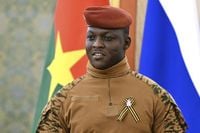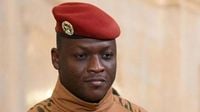On September 1, 2025, Burkina Faso’s transitional parliament unanimously passed a sweeping new law criminalizing homosexuality, setting off a wave of condemnation from human rights advocates and faith-based organizations across West Africa. The law, part of an amended Persons and Family Code, mandates prison sentences of two to five years and imposes fines on anyone convicted of consensual same-sex relations or conduct deemed to promote LGBTQ practices. According to the Associated Press, the law took effect immediately after the parliamentary vote, with officials insisting it upholds the nation’s “marriage and family values.”
Justice Minister Edasso Rodrigue Bayala, speaking on state television, left little doubt about the government’s intent. “A person who (engages in) homosexual practices ... will appear before a judge and, in the event of a repeat offense, be deported if you are not a Burkinabe national,” Bayala said, as reported by Reuters. He further described homosexual acts as “bizarre behavior,” underscoring the administration’s hardline stance. The legislation awaits the formal signature of military junta leader Captain Ibrahim Traoré, who has ruled the country since seizing power in a 2022 coup.
Burkina Faso’s move places it among more than half of Africa’s 54 countries that criminalize homosexuality, with penalties ranging from several years in prison to, in some cases, the death penalty. The new law also tightens regulations on nationality and statelessness, a point the government has highlighted as part of an effort to “modernize” family law and clarify citizenship rules. However, rights groups and international observers see the measure as a dangerous regression on civil liberties and a distraction from the country’s deepening security and economic crises.
The Interfaith Diversity Network of West Africa (IDNOWA), a prominent LGBTQ-friendly faith coalition, swiftly condemned the law in a statement issued on September 2, 2025. “IDNOWA stands in unwavering solidarity with LGBTQ+ communities across Africa and strongly denounced the recent passage of a law in Burkina Faso criminalizing homosexuality. This legislation, which imposes prison sentences of two to five years for consensual same-sex relations, is a direct assault on human rights, spiritual dignity, and the principles of justice that should guide any legitimate governance,” the group declared, as reported by 76 Crimes.
IDNOWA’s executive director, Davis Mac-Iyalla, did not mince words. “LGBTQ+ people are not outsiders—we are part of Africa’s story, its spirit, and its future. Criminalizing our existence is a betrayal of our shared humanity and a denial of the continent’s rich diversity,” Mac-Iyalla said. The organization called on Burkina Faso’s transitional government to repeal the law and focus on inclusive governance, the protection of civil liberties, and national healing. “True leadership does not come from repression—it comes from courage, compassion, and accountability,” the statement continued.
For many observers, the timing and context of the law’s passage are as telling as its content. Burkina Faso has been under military rule since 2022, when Captain Traoré led a coup promising to restore stability amid a surge in Islamist militant violence. Instead, according to the Associated Press, the junta has been accused by rights groups of clamping down on dissent, with reports of arbitrary arrests and forced conscription of critics. The new anti-LGBTQ legislation, critics argue, is part of a broader pattern of repressive measures aimed at consolidating the junta’s grip on power.
IDNOWA’s statement accused the government of using the law as “a dangerous distraction” at a time when citizens are demanding transparency, economic stability, and peace. “The government has chosen to scapegoat LGBTQ+ individuals to deflect from its own failures. Such tactics erode public trust and deepen social divisions,” the group said. The organization’s message to the international community was equally pointed: “Let it be known: silence is complicity. We will not be silent.”
The government, for its part, has framed the law as necessary to preserve national identity and uphold traditional values. Officials have argued that homosexuality is a foreign import, not a legitimate sexual orientation—a sentiment echoed in several other African countries with similar laws. As Reuters notes, anti-gay legislation remains on the books in nations such as Senegal, Uganda, and Malawi, while a handful of others, including South Africa, Botswana, and Angola, have moved in the opposite direction, decriminalizing same-sex relations and enacting protective measures for LGBTQ individuals.
The debate over LGBTQ rights in Africa is often cast as a clash between tradition and modernity, or between national sovereignty and international pressure. In Burkina Faso, the new law has been touted by officials as a recognition of “marriage and family values,” a phrase that resonates with many in the country’s conservative society. Yet, as the Associated Press points out, these laws, though criticized abroad, are often popular at home, where homosexuality is frequently portrayed as alien to African culture.
However, critics argue that such portrayals ignore both the historical presence of diverse sexualities on the continent and the real harm inflicted by criminalization. “As an interfaith and ancestral justice network, IDNOWA affirms that every human being carries divine worth. We reject any attempt to criminalize love, identity, or existence,” the organization’s statement read. Rights advocates warn that laws like Burkina Faso’s not only violate fundamental human rights but also fuel discrimination, violence, and social exclusion against already vulnerable populations.
Internationally, the passage of the law has sparked concern among human rights organizations and foreign governments. Many are watching closely to see whether junta leader Traoré will sign the legislation into law—a move that would further isolate Burkina Faso from global rights norms and potentially invite diplomatic consequences. The government’s rhetoric of pan-African independence and resistance to Western influence, as noted by the Associated Press, has found an audience among the country’s youth, but it also risks deepening divides both within Burkina Faso and between the nation and its international partners.
For LGBTQ Burkinabe and their allies, the immediate future is fraught with uncertainty. The new law’s sweeping provisions, coupled with the junta’s track record of repressing dissent, have created an atmosphere of fear and insecurity. Yet, as IDNOWA and others have made clear, the struggle for dignity and inclusion is far from over. “We urge regional and global allies to speak out, to protect those at risk, and to ensure that Africa’s future is not built on fear, but on freedom,” the group concluded.
As Burkina Faso charts its course through political turmoil and security challenges, the fate of its LGBTQ citizens has become a flashpoint in a broader battle over rights, identity, and the meaning of justice in contemporary Africa.


